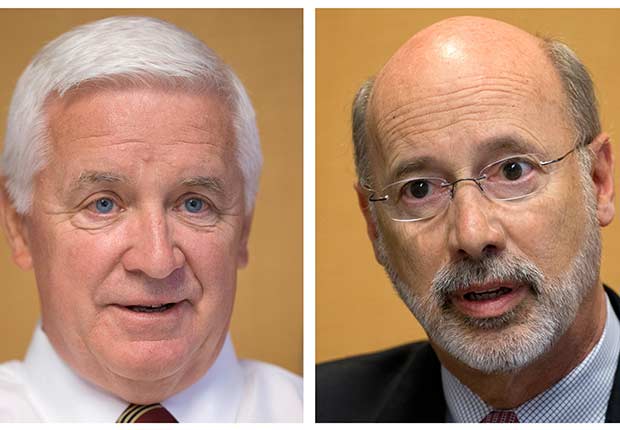AARP Hearing Center

By Hilary Appelman
Property taxes and health care spending are among the top issues facing Pennsylvania voters Nov. 4 as they choose between incumbent Republican Gov. Tom Corbett and Democratic challenger Tom Wolf.
The AARP Bulletin asked the two campaigns about issues of interest to older voters. Each campaign responded by email.
- Property taxes. Education spending has been a hot issue, and that’s of critical importance to many older Pennsylvanians because of its direct impact on property taxes.
More than 60 percent of the state’s school districts have raised property taxes each of the past three years. Next year, nearly 80 percent plan to raise taxes, according to the Pennsylvania Association of School Administrators and the Pennsylvania Association of School Business Officials.“The most hated tax in Pennsylvania is the property tax,” said political science professor Terry Madonna, director of the Franklin & Marshall College Poll. “I don’t think there’s any doubt,” he added, “that seniors are really upset.”Corbett has blamed property tax increases on the growing costs of teacher and other public employee pensions and pushed for reform of the state pension system, which, he said, could “bury our economic growth [and] swallow up benefits for our elderly.” Corbett has called for the creation of a 401(k)-style plan for future workers.Wolf, who favors a defined benefit retirement plan for public workers, said the unfunded liability is due to the state’s failure to make payments into the system.He said Corbett’s refusal to tax Pennsylvania’s fast-growing natural gas production and his cuts to education funding forced school districts to raise property taxes. Wolf supports a 5 percent extraction tax on gas production and wants the state to increase its share of education funding.Corbett has opposed taxing gas production, arguing it would hurt job growth.
- Home- and community-based services. The state ranks low in providing support services to people who want to stay in their homes as they age. “We need to take steps to balance state spending between nursing homes and services people can get in their homes and communities,” said AARP state advocacy manager Ray Landis.
Corbett originally declined to expand Medicaid under the Affordable Care Act, which can provide coverage for some home- and community-based services. But in August he reached an agreement with the Obama administration for an alternative plan that relies on private insurers to provide health care coverage to uninsured individuals.Wolf supports the traditional expansion of Medicaid and criticized Corbett for setting up a commission on long-term care instead of taking action. Wolf’s own “Pennsylvania Choice” plan would raise income eligibility for home- and community-based care.
- Utility deregulation. Proposed legislation on utilities is another key issue for older voters. One plan would end the current system, under which consumers who don’t choose a new electric power provider automatically remain with their traditional provider, and another would deregulate telephone service.
Corbett does not support such legislation at this time, campaign spokesman Chris Pack said: “Gov. Corbett believes that our seniors need access to affordable electricity and that seniors living on fixed incomes should not be subjected to sudden rate spikes. More studies are needed to ensure that rates are more competitive so undue hardships are not imposed on Pennsylvania seniors.”Wolf’s spokesman Jeffrey Sheridan said that “any legislative changes need to focus primarily on protecting consumers.” Wolf would work with “key stakeholders to further explore these issues and ensure that any legislative changes do not result in safety or access problems for Pennsylvania residents.”
For more information on state and federal candidates’ positions on issues, consult the voter guide at aarp.org/yourvote. AARP does not endorse candidates, contribute to campaigns or favor political parties.
Hilary Appelman is a writer living in State College, Pa.































































